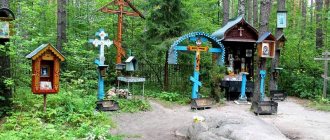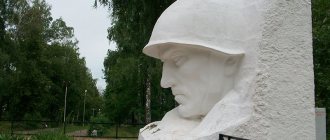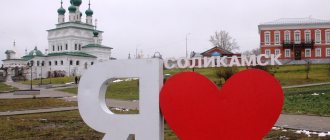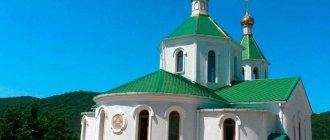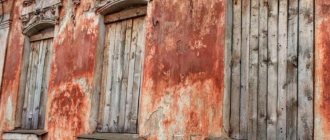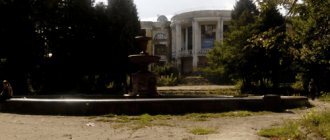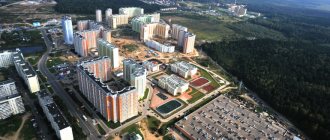I have been wanting to go to Diveevo, or, as it is often called, Divnoe Diveevo, for a long time. But somehow things didn’t work out. And so when my work colleague suggested that I go there, I didn’t think twice about it. Of course! Moreover, many talked about what wonderful changes happened to them after visiting this monastery. The trip to Diveevo took place in May 2013, during a long trip to Nizhny Novgorod, Diveevo, Murom and other cities.
♦ On topic: Excursions around Nizhny Novgorod and the Nizhny Novgorod region
Plan of the Holy Trinity Seraphim-Diveevsky Monastery
History of Diveevo
The village of Diveevo is located 180 km from Nizhny Novgorod and 65 km from Arzamas, almost on the border with Mordovia. It arose in 1559. According to one legend, its first owner was Murza Divey, from whom the name came. Ivan the Terrible, for his special services, granted Diveya a princely title and awarded him lands.
Diveevo turned out to be at the intersection of pilgrimage roads. In the second half of the 18th century, a wooden church was built here in the name of St. Nicholas the Wonderworker and Archdeacon Stephen. Pilgrims and wanderers found shelter and shelter in it. In the 1760s, the wanderer Agafya Semenovna Melgunova (late 1720/early 1730 - 1789), née Belokopytova, the widow of a wealthy Vladimir landowner, came here. After the death of her husband, she took monastic vows under the name of Alexandra. She became the founder of the Diveevo monastery.
With her own funds, she founded a temple in the name of the Kazan Icon of the Mother of God with two chapels - St. Nicholas and the First Martyr Archdeacon Stephen. Venerable Seraphim of Sarov predicted:
The Kazan Church, my joy, this will be a temple like no other! At the end of the world, the whole earth will burn, my joy, and nothing will remain. Only three churches from all over the world will be taken completely undestroyed to heaven: one in the Kyiv Lavra, the other ... (forgotten by the sisters), and the third is yours in Kazan, mother. Wow, what a Kazan church you have!
In 1788, construction began on lands donated by the local landowner Zhdanova, near the Kazan Church. Mother Alexandra and four novices settled here. They were called the Kazan community and lived according to the strict Sarov charter. Also, with the blessing of Seraphim of Sarov, the Mill Community was established in 1826.
In 1842, both communities were united and became known as Serafimo-Diveevskaya. In 1861, the community received the status of a monastery, the first abbess of which was Mother Maria (Elizaveta Alekseevna Ushakova). In 1848, according to the design of architect A.I. Rezanov, construction began on the Trinity Cathedral, consecrated on July 28 (August 9), 1875.
By 1917, 270 nuns and 1,474 novices lived in the Seraphim-Diveevo Monastery. After the revolution, difficult times came for the monastery, like other churches and monasteries throughout Russia. In 1919, a labor artel was registered on the basis of the monastery, and in 1927 the monastery was closed. In 1937, the Kazan Church was closed.
Since 1988, the revival of the monastery began. On July 31, 1991, the relics of St. Seraphim of Sarov were transferred to the Holy Diveevsky Monastery.
Holy Trinity Seraphim-Diveevo Monastery: photos and impressions of the visit
Village Diveevo
So, we arrived in Diveevo. The village itself, whose population is about 6.5 thousand people, seems to be all about pilgrims. Near the monastery there were traders, or rather, traders, selling what the pilgrim needed. Scarves and skirts are sold - in the Seraphim-Diveevo Monastery this is strict, women must wear a skirt/dress and cover their heads.
Problem with parking near the monastery
There is parking near the monastery. However, to our disappointment, there was a sign there that there was no room. Considering that I was driving a huge Mitsubishi L-200, this was somewhat disappointing. However, as it turned out, there were still places - our friends, who were driving the second car, parked calmly. It turned out that there were no places only for those who came overnight. But seeing the sign, it somehow didn’t occur to me to ask whether there were parking spaces or not. Having driven several circles around Diveevo and not finding any free ones (it was Saturday of Easter week, so there were a lot of people), I ended up parking the car with local residents near the house, right opposite the monastery. All the fun is 100 rubles. True, they helped us turn around in a bottleneck.
How to obtain permission to take photographs?
Next we had to get permission to take photographs. I was sent to a pilgrimage center. There was a line to the open window. The second window was open, but there was no one near it. However, there sat a stern nun who did not bother to answer whether permission could be obtained. As a result, after standing in line, I received permission to take photographs, paying either 30 or 50 rubles. Along the way, it turned out that I could do the same thing on the territory of the monastery, where the requirements are filled out.
Bell tower
Building on the territory of the monastery
Cathedral of the Life-Giving Trinity and Spaso-Preobrazhensky Cathedral in Diveevo
And here we are inside the monastery. In front of us are two huge cathedrals. The first, green, is the Cathedral of the Life-Giving Trinity , built between 1848 and 1875 by Ton’s student A.I. Rezanov, who also took part in the construction of the Cathedral of Christ the Savior in Moscow. In the Trinity Cathedral there is a shrine with the relics of Seraphim of Sarov.
A little further is a beautiful white temple - the Transfiguration Cathedral . They began to build it even before the revolution, but did not have time to consecrate it. During the Soviet years it housed a shooting range, then a garage. It was completed in the 90s and consecrated on September 3, 1998. We were not able to see the Transfiguration Cathedral from the inside - it was closed for cleaning
